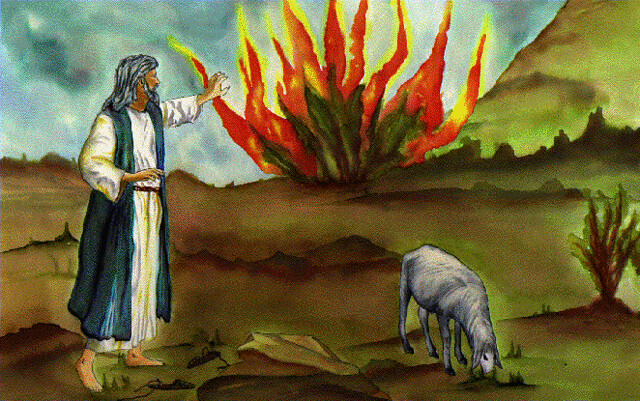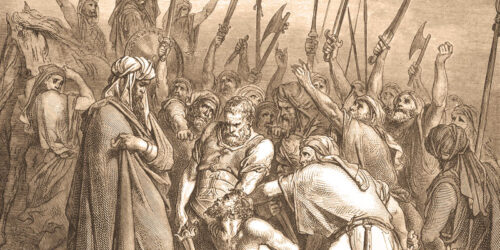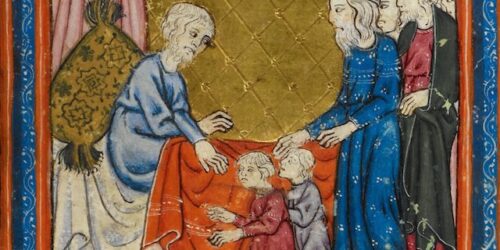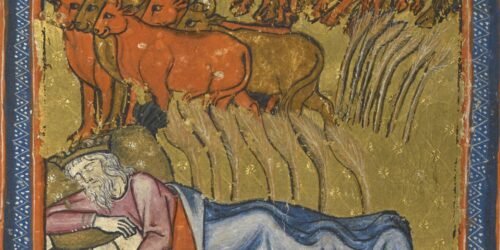He (Moses) saw an Egyptian beating a Hebrew, one of his kinsmen. He turned this way and that and, seeing no one about, he struck down the Egyptian and hid him in the sand. When he went out the next day, he found two Hebrews fighting; so he said to the offender, “Why do you strike your fellow?” He retorted, “Who made you chief and ruler over us? Do you mean to kill me as you killed the Egyptian?” Moses was frightened and thought; Then the matter is known!
Exodus 2:11 – 14
Unlike the midwives…who defied the decree of Pharaoh, Moshe is here pictured as a furtive, nervous and frightened agent of rebellion…Even the language, “He hid him in the sand” suggests a desire to avoid awareness…Unlike the midwives, who escape punishment, Moshe is targeted for death by Pharaoh. Worse, those he believed himself to be helping, his own Hebrew brethren, offer neither support nor appreciation of his actions…
Richard Hirsch (contemporary)
The Egyptian whom Moses slew was one who used to strike his Jewish victim habitually, and Moses had awaited an opportunity to find him when no other witnesses were present. That is why he looked in all directions. The fact that unbeknownst to him someone did see his deed, was what caused his surprise on the following day. Moses’ deed was one of the qualifications that fitted him for a role of leadership amongst his people.
Akedat Yitzchak (15th Century)
The Israelites said, “Aren’t you Yocheved’s son? What gives you the right to call yourself the son of Pharaoh?…Pharaoh learned from the Israelite Moshe saved. The Torah conceals the fact that Moshe had to flee because of his own brother’s treachery rather than because of Egyptian hostility.
Solomon Munk (20th Century)
I think it was an Israelite who told (on Moshe) and I think he told it because he resented the fact that Moshe was the only Jew in Egypt who wasn’t a slave…or perhaps he was afraid someone would find the Egyptian’s body and blame him. Or perhaps he just resented owing his life to someone else.
Harold Berman (Contemporary)
For Moses saw that the smitten man would no longer live…Rav Judah said…there was no man who would be zealous for God and slay him…The Sages said: He saw that there was no hope that righteous persons would arise from him or his offspring until the end of generations…As only Israelites were there, who are likened to sand, he hid him in their presence (in the sand)…Moses was meditating in his heart, “Where has Israel sinned that they should be enslaved more than all the nations?” When he heard these words (that the matter was known), he said: “Tale bearing is rife among them, and how can they be ripe for salvation?” Now I know the cause of their bondage.
Midrash Rabbah
Divine Providence foresaw that the saviour of Israel would hail from a foreign environment, steeped in idolatry and would be educated in Egyptian lore, divorced from his people and their tradition…Ibn Ezra dwells on this point in his commentary. This commentator regards it as providential that Moses should have originated from just such an environment of royalty and distinction. His superior education eminently fitted him for the task of leadership at a time when his brethren were slaves and suffered from an inbred slave mentality…His princely upbringing gave him the courage to slay the Egyptian maltreator of his brethren…had he grown up among his own people, they would have had no respect for him, and would have considered him just another Jew.
Nechama Leibovitz (20th Century)







